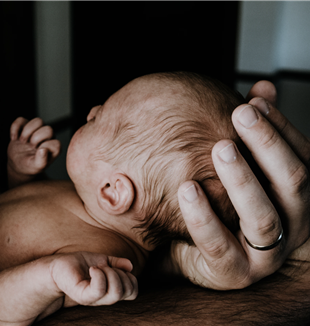
Birth Begs A Meaning
Part I of our new series The Religious Sense at Work: the witness of a postpartum nurse.The Religious Sense at Work is a weekly limited series that explores the way our communal reading of The Religious Sense informs and illuminates our experience of work.
I experience the religious sense at work constantly. As a postpartum nurse, I have the opportunity to witness birth, be one of the first sets of hands to hold a baby, to rub life into their bodies as they cry their first shrill cries. I witness mothers sacrifice their bodies day in and day out, sleepless nights and chapped nipples, c-sections scars and swollen abdomens, blood and sweat and tears and milk. I see fathers stand beside the women they love, powerless to effect any change in their experience of pain. I see them sleepily fumble to set up pillows for yet another late night breastfeed, see them cry at the awe of this tiny babe they have helped create. I watch as they attempt yet another swaddle that their babies will instantly wriggle out of.
At work I am busy. There is a business to healthcare, tasks and medications, antibiotics, exams, and admissions and discharges. There are families whose stories are not as joyful, who have no support, who are isolated, who are traumatized. Often, I end up stripping away the immutable experiences that accompany birth and I see only the material and measurable. Here, I see pain and exhaustion. Men and women pushed well beyond what they thought they were capable of giving. I see guilt and confusion and overwhelm. To me, this begs the question ‘Why’? What makes someone say, ‘I want to give up my body, my time, my independence for someone who I have never met, for someone who does not yet exist?’
If I look only at the physical or circumstantial experience of having a child, I am left deeply unsatisfied. Why struggle to bring another person into this world to suffer and struggle and die in an endless cycle? What pushes a woman who has lost 4 babies to miscarriage to try again, to risk loss once more? What causes a woman who is so debilitated with hyperemesis that she vomits 35 times a day and needs a feeding tube to continue with her pregnancy? What causes a teenager faced with an unplanned pregnancy to say that the ridicule and scorn and judgment is worth it? What causes a woman addicted to drugs to say that perhaps my baby could have a better life than what I can give, perhaps I could be a better mom? Often I see my work this way. Often I am faced with depths of suffering that shake my humanity to its core. Often when I look at my work I see a despair and resignation to the world that leaves my heart screaming for an answer adequate to its longing.
But, then, I hear a mother say, “This is better than I ever imagined”. A father whispers to me, “I didn’t know I could love my wife more than I did when I married her, and yet now I do.” I see parents in utter awe of a being who is nothing but dependency. And here, the immutable screams for recognition.
When I look at these responses, I see the religious sense. I see people who longed for a meaning so deeply that something entirely new was created. I see a longing for the infinite, for something that cannot be measured simply in the hours spent breastfeeding, the diapers changed, the sleepless nights. I see people who are seeking a destiny that lies beyond the horizon of what we can see and measure. I see people begging for more, for fuller life, for an ultimate fulfillment of desire. I see people seeking God, for “Only the existence of the mystery is adequate to our human structure, which is mendicity, insatiable begging, and what corresponds to us is neither ourselves nor something we give to ourselves, measure, or possess” (Guissani, RS 58).
What corresponds to this desire for meaning finds a fulfillment in the recognition of what these parents see all the time, that nothing they have done or could do gives this new life its infinitude. There exists beyond us a Mystery which is itself the fulfillment of these desires, Who bestows in each of us an infinite destiny beyond our own capacity to imagine or hope for.
Birth begs a meaning that is more than its quantifiable aspects. It opens me to a world of questions where I grapple with the disparity between what I long for and what I am given. It leads us, through the creation of new life, to an openness to the infinite of another’s humanity and destiny, to an openness to Another’s call to abundant life.
Maddie, Denver, CO